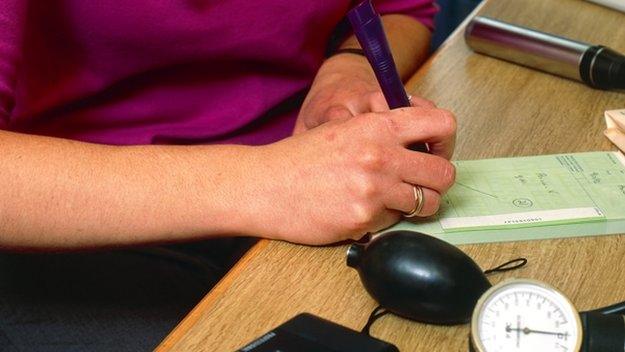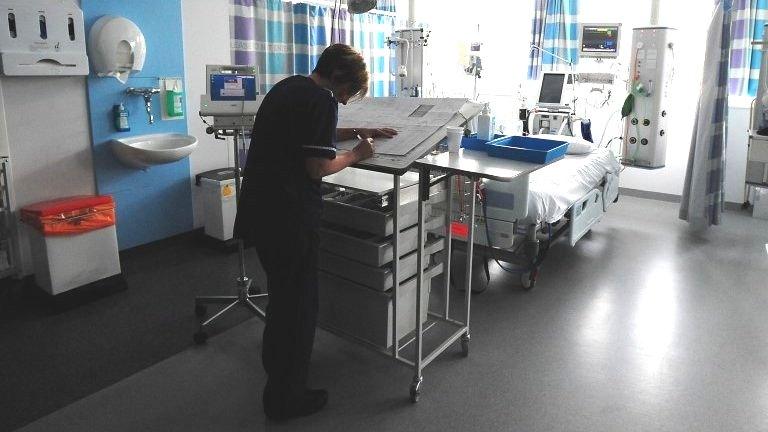Jeremy Hunt: Doctors 'must work weekends'
- Published
Jeremy Hunt: 'We have 6,000 avoidable deaths every year'
Health Secretary Jeremy Hunt has said he is prepared to impose seven-day working on hospital doctors in England.
Mr Hunt said that a "Monday to Friday culture" in parts of the NHS had "tragic consequences" and said 6,000 people die each year because of this.
British Medical Association leader Dr Mark Porter said the union supported more seven-day working but accused Mr Hunt of being "too simplistic".
A September deadline has been set by Mr Hunt for a deal with the BMA.
BMA leader Dr Mark Porter asks for more details from the government
The current consultant contract means senior doctors can opt out of weekend work as long as it is non-emergency in nature - although they are still expected to be on call.
In a speech in London, Mr Hunt promised he was prepared to enforce changes if necessary by imposing a new contract on newly-appointed consultants.
It is part of the push to deliver a seven-day-a-week NHS in England.
Drive up standards
By ensuring all new consultants do not have the right to opt out, Mr Hunt believes over the course of the parliament he will gradually get enough senior doctors in place to drive up standards at weekends.
While he is within his powers to impose such a deal, the move threatens to sour relations with the medical profession - especially as a number of hospitals have already started altering rota patterns to create a more even spread of cover.
The BMA pulled out of talks last year amid concerns over workload.

Analysis

The 6,000 figure for the number of extra weekend deaths that was used by the government was from research that has yet to be published.
But there is already robust evidence showing that a weekend admission is linked to a higher chance of death, but what is still not obvious is what exactly causes this.
Research from three years ago published in the Journal of the Royal Society of Medicine showed 1.3% of people who are admitted to hospital die within 30 days.
Death rates were higher for weekend admissions - compared with admission on a Wednesday they were 16% higher for Sunday and 11% for Saturday.
But, crucially, it was not clear to what extent this was down to a lack of experienced staff.
Another factor could have been the fact that people with a greater severity of illness may be admitted at weekends because of a lack of services in the community for those at the end of life.
Although that in itself is another argument for seven-day services - across the whole NHS. Whether there is the money available for that is another matter.

Mr Hunt said: "The problem dates back to 2003 when the then government gave consultants the right to opt out of working at weekends - that's a right that nurses don't have, midwives don't have, paramedics, ambulance drivers and so on don't have and that has created a Monday to Friday culture in many parts of the NHS with tragic consequences for patients.
"And if you want the evidence it's very straightforward. We have around 6,000 avoidable deaths every year because if you are admitted to hospital on a Sunday you have a higher chance of dying than if you are admitted on a Wednesday."
He said it was "not a war against consultants" and that "many medical directors" and professional bodies "want that sense of vocation and professionalism brought back into the contract".
"We are not asking any doctor to work longer hours or unsafe hours... but there will be times where we do need that senior consultant cover at weekends."
He accused the BMA of being out of touch with its members and said he would not allow them to be a "roadblock" to reform, before warning: "Be in no doubt, if we can't negotiate, we are ready to impose a new contract."
His comments came just a month after he tried to entice GPs to move towards more seven-day working by promising to recruit extra staff to relieve the pressure on services.

The BMA has argued that to improve care at weekends you also need more support services such as diagnostics and pathology as well as care in the community to allow patients to be discharged.
"Today's announcement is nothing more than a wholesale attack on doctors to mask the fact that for two years the government has failed to outline any concrete proposals," said Dr Porter.
"How will he ensure there isn't a reduction in mid-week services or fewer doctors on wards Monday to Friday?"
The BMA has also released a survey of 2,000 adults which found two thirds did not believe the NHS could afford seven-day services.
But the Royal College of Emergency Medicine said it was pleased the health secretary was pushing ahead with seven-day services.
College president Cliff Mann said there was an "intrinsic unfairness" in the current system that meant in some specialities like his own doctors were already providing a seven-day service while other areas of the NHS were not.
- Published16 July 2015
- Published21 June 2015

- Published19 June 2015

- Published19 June 2015
- Published30 September 2014

- Published15 December 2013
